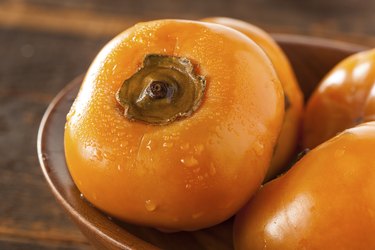
Tannic acid, or tannin, is a bitter tasting substance called polyphenol that is derived from plants. This compound acts as an astringent when consumed or applied topically, which means it shrinks or constricts the body tissues. Tannic acid is the component of red wine or unripe fruit that makes your mouth want to pucker. According to Cornell University Department of Animal Science, the primary function of tannic acid is to bind and precipitate proteins. Tannic acid is a component on many foods we eat on a daily basis.
Grapes
Video of the Day

Grapes contain a high concentration of tannins. The tannin concentration of grapes is critical to the art of wine making. According to Tarac Technologies, tannic acid is essential is wine making because it ensures the wine's palate balance and complexity. In addition, it is crucial for the stability of the color of the wine and it helps to enhance the aging process of the wine.
Video of the Day
Green Tea

Green tea is another product that contains a rich concentration of tannic acid. According to the Industrial Toxicology Research Centre in Lucknow, India, the presence of tannic acid in green tea has been proven to have antioxidant benefits by inhibiting the production and excessive release of nitric oxide in the human body. Excessive production of nitric oxide can lead to inflammation and tissue damage.
Persimmons

According to "Permaculture Plants" by Jeff Nugent and Julia Boniface, the unripe persimmon fruit contains a high concentration of tannic acid. For this reason, the unripe persimmon is very unpalatable and nearly inedible due to the astringent-like characteristic of the fruit. As the persimmons ripen, the tannic acid concentration decreases which allows the persimmons to be eaten raw, dried or incorporated into jams and jellies.
- Cornell University Department of Animal Science: Tannins: Fascinating But Sometimes Dangerous Molecules
- PubMed.gov: Tannic Acid Stimulates Glucose Transport and Inhibits Adipocyte Differentiation in 3T3-L1 Cells
- Tarac Technologies: Grape-derived Tannins and Their Application
- PubMed.gov: Green Tea Polyphenols and Tannic Acid Act As Potent Inhibitors of Phorbol Ester-Induced Nitric Oxide Generation in Rat Hepatocytes Independent of Their Antioxidant Properties
- Permiculture Plants by By Jeff Nugent, Julia Boniface